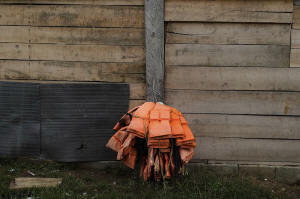A jungle route once carried hundreds of thousands of migrants. Now the
local economy has crashed
[April 16, 2025] By
MEGAN JANETSKY and MATÍAS DELACROIX
VILLA CALETA, Panama (AP) — The face of U.S. President Donald Trump
flashes on the flat-screen TV that Luis Olea bought with the money he
earned ferrying migrants through the remote Panamanian jungle during an
unprecedented crush of migration.
The Darien Gap, a stretch of nearly impenetrable rain forest along the
border with Colombia, was transformed into a migratory highway in recent
years as more than 1.2 million people from around the world traveled
north toward the United States.
They brought an economic boom to areas that are hours, even days, from
towns or mobile phone signal. Migrants paid for boat rides, clothing,
meals and water after grueling and often deadly treks.
With that burst of wealth, many in towns like Olea's Villa Caleta, in
the Comarca Indigenous lands, abandoned their plantain and rice crops to
carry migrants down the winding rivers.
Olea installed electricity in his one-room wooden home in the heart of
the jungle. Families invested in children's education. People built
homes and more hopeful lives.
Then the money vanished. After Trump took office in January and slashed
access to asylum in the U.S., migration through the Darien Gap virtually
disappeared. The new economy bottomed out, and residents newly dependent
on it scrambled for options.
“Before, we lived off of the migration,” 63-year-old Olea said. “But now
that’s all gone.”

‘Like you’ve discovered a gold mine’
Migration through the Darien Gap soared around 2021 as people fleeing
economic crises, war and repressive governments increasingly braved the
days-long journey.
While criminal groups raked in money controlling migratory routes and
extorting vulnerable people, the mass movement also injected cash into
historically underdeveloped regions, said Manuel Orozco, director of the
migration, remittances and development program at the Inter-American
Dialogue.
“It became a business opportunity for a lot of people,” Orozco said.
“It’s like you’ve discovered a gold mine, but once it dries up … you
either leave the area and go to the city or stay living in poverty."
Olea, like many of the Comarca, once survived by growing plantains in
the jungle next to Villa Caleta, near the Turquesa river flowing near
the Colombia border.
When migrants began to move through the region, Olea and others invested
in boats to pick up people in the town of Bajo Chiquito, where migrants
arrived after their brutal trek.
The boat pilots known as lancheros would transport migrants to a port,
Lajas Blancas, where they would take buses north.
Pilots like Olea, known as lancheros, would earn up to $300 a day, far
above the $150 a month many had made from crops. The work grew so
lucrative that towns along the river struck a deal to take turns
transporting migrants, so each community would have their share.
Olea installed solar panels on his tin roof. He elevated his house to
protect belongings from floods, and bought a water pump and a
television. He now watches Trump talk about tariffs on CNN en Español.
The money connected him, and Darien communities, to the world in a way
that had not existed before.

[to top of second column] |

Lifejackets hang at the home of a local in Villa Caleta, Panama,
Monday, April 7, 2025. The jackets were once used to ferry migrants
after their trek across the Darien Gap on their way north to the
U.S. (AP Photo/Matias Delacroix)
 ‘There’s no market anymore'
While some residents saved their cash, many more were left reeling
from the abrupt drop in migration, said Cholino de Gracia, a
community leader.
“The worst part is that some people struggle to eat, because without
any income and no supermarkets here, what can people buy?” de Gracia
said.
Olea has started growing plantains again, but said it will take at
least nine months to yield anything. He could sell his boat, which
now sits unused, but conceded: “Who’s going to buy it? There’s no
market anymore.”
Pedro Chami, 56, another former boat pilot, gave up on his crops.
Now he sits outside his home carving wooden pans. He hopes to try
his luck sifting through river sand for flecks of gold.
“I’m trying this to see if things get better, see if I can buy some
food," Chami said. "Before, I would always have my $200 a day
without fail. Now, I don’t even have a cent.”
At the height of the migration, Panamanian authorities estimated
that between 2,500 and 3,000 people crossed the Darien Gap every
day. Now, they estimate around 10 cross weekly.
Many more migrants, mainly Venezuelans, have started to travel south
along Panama’s Caribbean coast in a “reverse flow " back home.
The Gulf Clan, the criminal group that profited from the northward
migration, now scouts the coast to see if it can make money off
migrants going the other way, said Elizabeth Dickinson, a senior
analyst for International Crisis Group.
Lajas Blancas, the river port where boats dropped off migrants after
their jungle journey, has been transformed. It once bustled with
crowds browsing stalls selling food, SIM cards, blankets and access
to power banks for charging phones.
Now the port and makeshift migrant camp are a ghost town, lined with
signs advertising “American clothes” written in red, white and blue.

Zobeida Concepción’s family, living on their land, is one of three
that haven’t abandoned Lajas Blancas. The 55-year-old said most who
sold goods to migrants have packed up and headed to Panama City to
look for work.
“When Donald Trump won, everything came to a screeching halt,” she
said.
Concepción’s family sold water, soda and snacks and even temporarily
opened a restaurant. With the earnings, she bought a new bed,
washing machine, refrigerator and three big freezers to store goods
sold to migrants. She started to build a house with her husband.
She said she’s unsure what to do next, but has some savings. She'll
keep the freezers, too.
“I’m going to save them for whatever comes,” she said, with future
U.S. administrations in mind. “When another government enters, you
never know what opportunities there will be."
All contents © copyright 2025 Associated Press. All rights reserved |